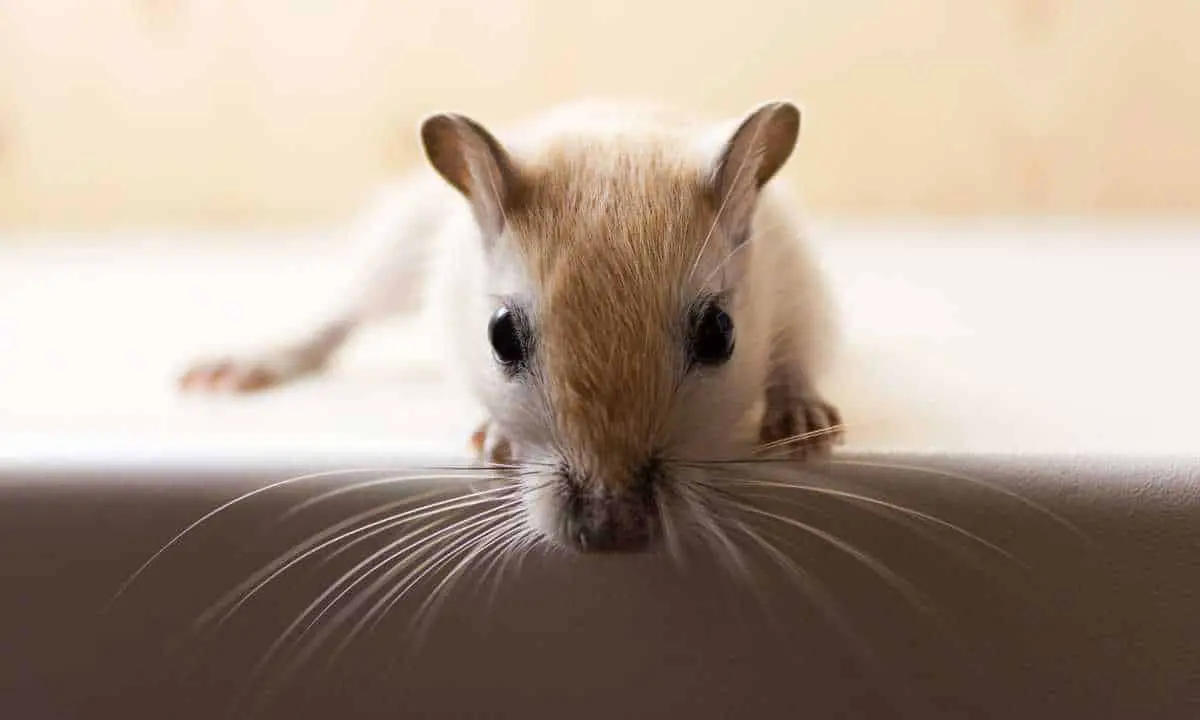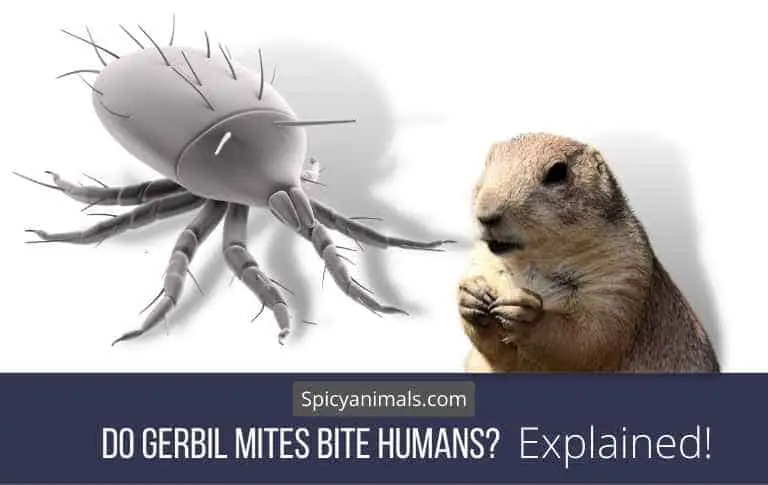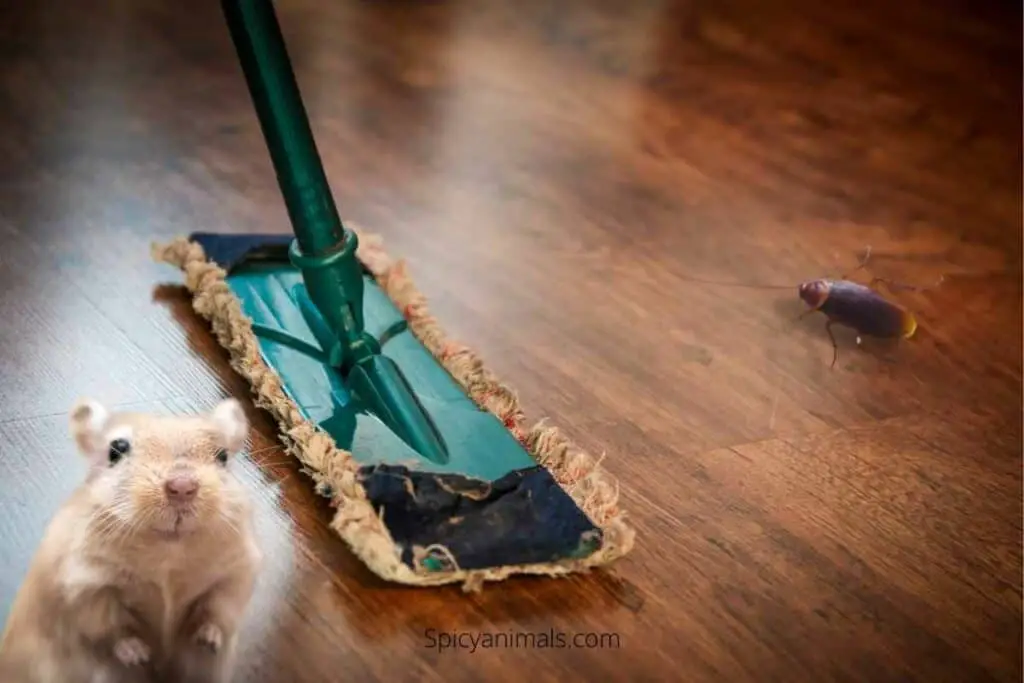When it comes to the death of a beloved pet, it can be difficult to know what to do. This is especially true when it comes to gerbils, as they are small and delicate creatures that require special care.
It is important to handle the death of a gerbil properly in order to ensure that other gerbils in the same cage remain safe and healthy. In this article, we will discuss what you should do with a dead gerbil and how you can give them a befitting burial.
Gerbils are susceptible to sudden death from strokes and heart disease, which can cause quick-onset symptoms such as seizures and swelling. Shock or fright can trigger seizures that lead to death. Even old age can result in sudden death for gerbils, as their lifespan is only 2-3 years. It’s important to monitor your gerbil’s health regularly and seek veterinary care if any concerning symptoms arise.
Table of Contents
How To Check Whether Your Gerbil Is Dead
When it comes to checking whether your gerbil has passed away, there are a few physical signs you can look out for. Firstly, observe your gerbil for several minutes to see if they are breathing. If the breathing has slowed down to an unnoticeable rate, this could be an indication that your gerbil is no longer alive.
If you’re unsure whether your gerbil has died or not, it’s important to seek veterinary assistance as soon as possible. This way you can get a definitive answer and also ensure that any other pets in the house are safe from potential diseases.

How To Dispose Of A Dead Gerbil
Disposing of a dead gerbil can be a difficult and emotional experience. It’s important to consider all the options available and check local regulations on pet disposal before making a decision.
One of the most common ways to dispose of a dead gerbil is to bury it in the back yard, marking it with a memorial feature. This is an affordable option that allows you to give your pet a befitting burial.
You should check local regulations on pet disposal before proceeding as some areas may have restrictions or require permits for backyard burials.
Another option is to bury your gerbil in a pet cemetery. This can provide closure and comfort for those who are grieving their loss, but it may be more expensive than other methods of disposal.
You can also take your gerbil to the vet and have them take care of disposing of its body. This can be more expensive than other options, but it ensures that your gerbil will receive proper treatment and respect during its final moments.
It’s not recommended to dispose of your gerbil in the regular trash bin as this could attract pests or spread disease. Composting is another option, although it requires special equipment and knowledge about how to do it safely and correctly.
A cremation is also an option, with different methods available depending on the size of your pet and budget constraints.
No matter which method you choose for disposing of your gerbil, make sure you follow all local regulations on pet disposal and any specific requirements that need to be followed in order to ensure that you’re giving your beloved pet the respect they deserve in their final moments.
What To Do When A Gerbil Dies
When a beloved pet gerbil passes away, it can be difficult to know what to do. The first step is to properly handle the cage and any toys or accessories that the gerbil used. Cleaning and sanitizing these items is important to prevent the spread of any illnesses or parasites.
It is also important to assess the health of any other gerbils in the home, as they may be at risk of contracting an illness that caused their companion’s death. In some cases, euthanasia may be necessary for a sick or suffering gerbil and seeking veterinary guidance in these situations is essential.
Lastly, it is important to provide emotional support for those grieving the loss of their pet. Tips on coping with grief and loss include seeking support from friends, family, or a professional counselor.
Will A Gerbil Eat A Dead Gerbil?
Yes, gerbils can and do eat each other. This behavior is known as cannibalism, and it’s a totally natural instinct for them. Cannibalism in gerbils can occur for a variety of reasons, such as hunger, territoriality or maternal instinct.
In some cases, if there isn’t enough food to go around or if the gerbil feels threatened by another one in its territory, it may resort to cannibalism in order to survive. It’s also common for mothers to eat their stillborn or dead offspring.
If you have multiple gerbils living together and one dies, it’s important to remove the body quickly so that the other gerbils don’t start eating it.
You should also make sure that your gerbils have plenty of food and water available at all times so they don’t resort to cannibalism due to hunger.
Providing them with plenty of toys and activities can help reduce stress levels and prevent them from feeling threatened by one another.
Overall, while cannibalism is a natural instinct for gerbils, it’s important to take steps to prevent it from happening in your own home. By providing your gerbils with plenty of food and water as well as toys and activities, you can help ensure that they stay healthy and happy without resorting to cannibalistic behavior.
Can I Get Sick from Handling A Dead Gerbil?
When it comes to handling a dead gerbil, there are potential health risks that should be considered. Bacterial infections can occur if the gerbil is not handled properly, and allergic reactions may also occur due to contact with the animal’s fur or droppings.
It is important to wear protective gloves when handling a dead gerbil in order to avoid any potential health risks.
Proper sanitation methods should also be used when disposing of a dead gerbil. Burying the animal in your backyard is one option, however, it is important to mark the grave with a memorial feature so that you know where it is located.
Alternatively, vets can take care of the disposal for you. It is not recommended to dispose of your gerbil in the regular trash bin as this could attract pests or spread disease.
Overall, it is important to handle a dead gerbil with caution and use proper sanitation methods when disposing of it in order to avoid any potential health risks.
What To Do When One Gerbil Dies {Will Others Be Ok?}
When one of your beloved gerbils passes away, it can be a difficult time for both you and the remaining gerbil. It is important to understand the potential risks and benefits of having a single gerbil, as well as the importance of proper introductions if you decide to get another gerbil.
Gerbils are social animals and prefer living in pairs or groups. While it is possible for a gerbil to survive alone, it is not recommended.
A single gerbil may become lonely and depressed, leading to health problems such as weight loss and decreased activity levels. Additionally, they may become aggressive due to a lack of companionship.
If you decide to get another gerbil after one dies, it is important that you introduce them properly.
This will help ensure that the new gerbil is accepted by the remaining one and that they form a strong bond. Introducing two unfamiliar gerbils can be stressful for both animals, so it is important to do this slowly over several days in a neutral environment.
There is evidence that suggests that gerbils do indeed experience grief when their bonded partner dies. A grieving gerbil may show signs such as lethargy, loss of appetite, or increased aggression toward other animals or humans.
If your remaining gerbil shows any of these signs, it is important to provide extra care and attention during this difficult time.
Providing additional enrichment activities such as tunnels or toys can help keep your gerbil occupied while they adjust to life without their partner.
If one gerbil dies, it is important to prevent cannibalism by removing the body from the cage as soon as possible. It is best to dispose of the body in a respectful way, such as burying it in a garden or wrapping it up and placing it in the trash.
If you have multiple gerbils, it is important to monitor them closely after one has died to make sure that they are not eating each other.
It can be difficult for a single gerbil to stay entertained and stimulated without another gerbil companion. To keep them happy, it is important to provide daily interaction and handling.
This can include petting them while they are in their cage or taking them out for supervised playtime with appropriate toys.
Additionally, providing enrichment activities such as hiding food around their cage or giving them chew toys can help keep them occupied and engaged.
Gerbils are naturally shy and timid creatures, so it is important to provide them with plenty of hiding spaces in their habitat.
This will help them feel secure and comfortable in their environment. Hiding places can be made from cardboard boxes, paper towel rolls, or even store-bought hideouts. It is important to make sure that any homemade hideouts are safe for your gerbil and free from sharp edges or small holes that they could get stuck in.
Gerbils have a natural instinct to chew, so providing them with appropriate chew toys is essential for their mental and physical health.
Chew toys can be made from untreated wood, cardboard tubes, or even store-bought items such as mineral blocks or wooden blocks.
It is important to make sure that the chew toys are safe for your gerbil and free from toxins or sharp edges that could harm them.
Exercise wheels are an essential part of a gerbil’s habitat as they provide an outlet for the gerbil’s natural energy and curiosity.
Exercise wheels should be large enough for the gerbil to move freely without being cramped, but not too large that it takes up too much space in the habitat.
It is also important to make sure that the wheel has no sharp edges or gaps that could injure your gerbil while running on it.
Getting another gerbil as a companion for your single gerbil can be beneficial as it provides companionship and stimulation.
However, it is important to properly introduce the two gerbils before putting them together in the same habitat as they may fight if not done correctly.
You should also make sure that you have enough space in the habitat for two gerbils and provide plenty of hiding spaces so each one has its own area to retreat to when needed.
Regular veterinary checkups are essential for maintaining your gerbil’s health and well-being. During these checkups, your vet will look out for signs of illness such as skin lesions, respiratory issues, dental problems, parasites, or other health concerns.
It is also important to keep an eye out at home between checkups and contact your vet immediately if you notice any changes in the behavior or physical appearance of your pet gerbil.
Conclusion:
In conclusion, gerbils are vulnerable to sudden death from various causes such as strokes, heart disease, and seizures triggered by shock or fright. Even old age can lead to an unexpected death in gerbils due to their short lifespan.
As responsible pet owners, it’s crucial to monitor the health of our gerbils regularly and seek veterinary care if any concerning symptoms arise. By doing so, we can help ensure our furry little friends live happy, healthy lives.




